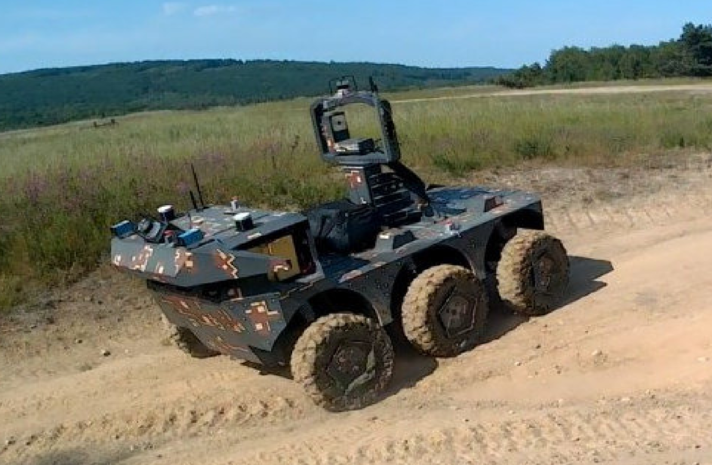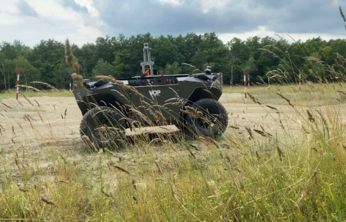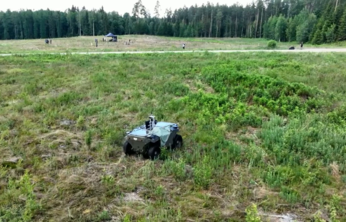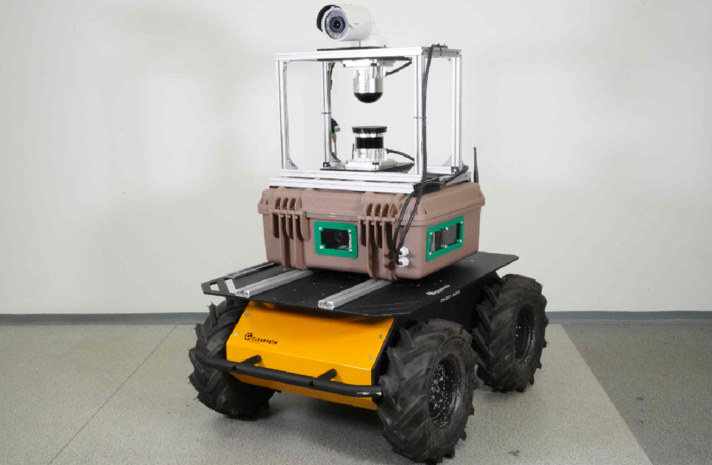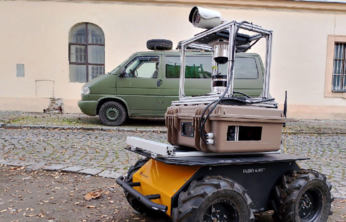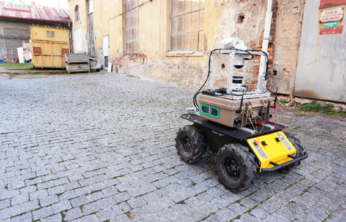Visitors will be able to see live demonstrations from the field of acoustic detection, cyber security, autonomous robotics and wireless communication systems at the CTU FEE exposition. Special attention will be paid to solutions that work in conditions without access to GNSS (Global Navigation Satellite System), including mobile units for perimeter protection or autonomous control in the field. The results of projects developed within the NATO Science and Technology Organization (STO) research platform will also be presented.
"Our ambition is to show that our faculty has technologies and know-how that have a concrete benefit for the defence industry and the preparation of human resources for the security sector. In many areas we are already a reliable partner for public and private sector organisations - whether it is quality measurement of communication networks, sensors for explosives detection or expert training in the field of cyber security," says Prof. Petr Páta, Dean of the CTU Faculty of Electrical Engineering, which has long been linking research, teaching and technology transfer into practice. Students are also involved in the development of a number of systems, gaining unique experience, for example through internships in the state administration or with industrial partners.
The Faculty of Electrical Engineering as a part of the Czech Technical University in Prague is a partner of the Czech Army within the Memorandum of Cooperation in the field of development of breakthrough technologies and repeatedly implements joint educational and research projects. Participation in IDET 2025 is a natural outcome of this cooperation and an opportunity for establishing new partnerships.
Artificial intelligence security robot handles autonomous operation even in busy environments
The team of Prof. Jan Faigl from the Laboratory of Computational Robotics of the Centre for Artificial Intelligence of the FEE CTU will present at IDET 2025 an autonomous ground robotic unit designed to protect critical infrastructure objects in an environment without GNSS signals. The robot is equipped with a four-wheeled chassis with the ability to rotate on the spot, a sensor tower with two 360° lidars and several cameras, including multispectral ones. The system is being developed in cooperation with the Ministry of Interior of the Czech Republic and is designed for long-term autonomous surveillance with wireless charging capability. In the event of a perimeter breach, the robot autonomously arrives at the site, initiates recording or acoustic signalling and cooperates with human security guards.
"Our goal is to create a system that will show that autonomous patrolling in a real environment is technologically and practically possible," says Ing. Jiří Kubík, who as a PhD student is involved in the development of the software and sensor system.
Autonomous platform for fast movement in the field
The team of Tomáš Haniš from the Department of Control Engineering at FEE CTU will present a new autonomous platform for dynamic movement of ground robots. In contrast to conventional systems, this technology does not focus only on route planning, but primarily on enabling the robot to perform demanding manoeuvres in real time, even on unpredictable or unpaved surfaces. "We want to drive as fast as we can with a given asset in a given environment - without compromises due to computational limitations or inadequate control. We're not just concerned with where the robot has to go, but more importantly how it gets there," explains Associate Professor Tomáš Haniš.
The team of doc. Haniš has been working on these technologies since the very beginning, they are largely based on automotive technologies and in this case it is a technological transfer to the robotic application domain. "We have already applied our results and experience, for example, in the autonomous vehicle competition in Toronto, where the FEE student team won first place in a competition of 38 universities worldwide," adds Haniš.
E-Shaper: network emulation for defence and education
The Department of Telecommunication Engineering of the FEE CTU will present in Brno the E-Shaper and F-Tester® EDU Kit - a compact technology for emulation and deliberate disruption of telecommunication networks, designed for testing the resilience of systems and teaching cybersecurity. The device includes a set of components that enable the generation and influence of data traffic, including fault simulation. It is complemented by laboratory tasks that can be used in teaching at vocational schools and during training in military and security forces. "We want to demonstrate that we can offer a fully transparent solution that enables credible emulation of communications even under jamming conditions - whether for training personnel or verifying technologies in the defence sector," says Dr. Zbyněk Kocur, head of the development team.
The facility has been designed as a versatile tool for research, teaching and practice and capitalizes on the experience from previous projects, for example, for simulating communication under deep-sea mission conditions with the Hydronaut module, including use for spaceflight simulations. Its flexibility allows it to be adapted to different types of networks and scenarios - from common school applications to critical military simulations. Interest in F-Tester® has been expressed by experts from CETIN, among others, who are deploying it in real-world conditions and using it to validate next-generation mobile networks. The educational version is offered to schools at a discounted price.
Acoustic detection and sensors for modern defence
At IDET 2025, the Department of Measurement of the CTU FEE will present a system for acoustic gunfire detection that uses artificial intelligence to determine the position of the shooter, type and calibre of the weapon. With high accuracy in determining the location and type of source and the ability to process an event within seconds, this system offers significantly higher reliability than commonly available commercial technologies. It is suitable for both military and civilian deployments - for example, in schools, hospitals or public areas. "This is the practical result of our long-term research in the field of sensors and advanced signal processing. This technology was developed as a result of purely academic research, without the involvement of commercial companies. It shows that even on university soil it is possible to develop cutting-edge systems that can withstand the strict requirements of the defence sector," says Prof. Jan Holub, Head of the Department of Measurement at FEE CTU.
In addition, other sensors and measurement technologies for defence applications will also be on display at the CTU FEE stand: a drone with a magnetic sensor for detecting explosives and landmines, a GNSS signal interference detector already used by security forces, or a laser simulator with a weapon and voice test, demonstrating the measurement of audio transmission intelligibility under stress conditions. All of these technologies share a common focus on the use of advanced sensors and advanced signal processing and measurement techniques in defence industry projects, including a number of examples of collaboration with military and industrial partners.
Cybersecurity: from consulting to international certification
Netacad FEE CTU offers comprehensive services in the field of cyber security - from expert consulting to training in preparation for international certification. It provides customers from the public and private sector with IT systems resilience analysis, recommendations for ensuring compliance with legislation (e.g. NIS2) and systematic staff development. All trainings are conducted in Czech language and led by certified experts. "We are the only academic partner of CompTIA in the Czech Republic. Our goal is to show in a clear and practical way how to defend against cyber threats and how to build resilient organisations," says Dr. Jaroslav Burčík, Head of the Cyber Security Centre at FEE CTU.
An example is the strategic cooperation with the Office of the Government of the Czech Republic, which is based on a memorandum signed at the end of 2023. The cooperation includes an initial analysis of the security situation, staff training and pilot student internships. "Cybersecurity is a people issue. Our job is to change habits, prevent threats and offer institutions and companies an expert team that will look at their infrastructure through the eyes of an attacker - while offering concrete improvements," Burčík adds. FEE's educational programmes are open not only to state institutions, but also to companies in the critical infrastructure and defence sectors, including a specialised offer for members of the Czech Army, with which the faculty has also long cooperated.

